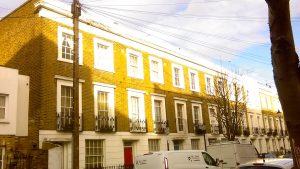 Islington wasn’t always Islington. Or rather, it was, but the meaning of the name changed over the years, as meanings do. Just in my own life-time it transformed from a place where there were precisely two wine bars (The Actors Retreat with its lethal wet spiral staircase outside leading down to the basement it was in and Serendipity, or Dips as it usually was for those whose office was next door, literally two doors down the corridor in the upstairs of the converted tram garage we thought was so wonderfully trendy) to a place lampooned on TV as being full of them.
Islington wasn’t always Islington. Or rather, it was, but the meaning of the name changed over the years, as meanings do. Just in my own life-time it transformed from a place where there were precisely two wine bars (The Actors Retreat with its lethal wet spiral staircase outside leading down to the basement it was in and Serendipity, or Dips as it usually was for those whose office was next door, literally two doors down the corridor in the upstairs of the converted tram garage we thought was so wonderfully trendy) to a place lampooned on TV as being full of them.
Keith Waterhouse wrote about how rubbish it was when he moved in and how rubbish it still was in 1970ish. Even when I moved into Bromfield Street (formerly King Edward Street, but after that business with the Simpson woman, well, you know…) it was endearingly crap. There was a bombsite at the end of the road known as the Cats Carpark, because it was infested with feral cats that animal protection people trapped, neutered and released back to the carpark staffed by huge tough-looking blokes who seemed like extras from The Sweeney and may well have been, all of whom kept a weather-eye out for the cats and their helpers. There was a shop where you could buy second-hand gas cookers for £50, like something out of Minder. A barber which was also a tailors, Chapel Market for fruit and veg and a strange, tiny shop that sold the oddest of odd things, freshly made pasta for about £40 a plate-load. So far ahead of its time and all long before that godawful multiplex cinema was astral-projected straight into the middle of our manor. Prostetnic Vogan Jeltz would have been so pleased.
Don’t Panic
While Hotblack Desiato was a bona fide estate agent the house next door was a squat, which was a pain because they kept having loud fights until one night the police literally carted everyone away, after which it was blissfully quiet. There was a gay pub at the end of the road which regularly had its windows put in, as gay pubs did in those days, usually by the National Front according to the graffiti. Quite why a group of young men exclusively fond of each other’s company in skin-tight jeans, figure-hugging shirts and big rufty-tufty boots should have been so exercised about gay pubs was always a bit beyond me. I wasn’t that comfortable when I went there when I first moved in one winter, not knowing it was a gay pub and the warmest clothes I had were motorcycle leathers, but I never got clothes right in London anyway. It didn’t make me want to smash their windows.
Not having much money I read a lot. One of the books I read was the Hitchhikers Guide to the Galaxy, which featured Islington quite a lot. Douglas Adams still lived there in those days and if you read the second book in the five-part trilogy carefully enough you could find his converted warehouse easily enough, round the back of Screen on the Green.
He and I shared the same parking garage, in a time when it seemed totally normal to drive around Central London, cutting down along the route of the 19 bus along Roseberry Avenue and Picadilly to get to the M4 and westwards. Every year Douglas Adams got a brand-new Porsche 911. Every year within weeks the inside would be even more fantastically messy than my cars get. He always had in those blissful pre-satnav days, a huge envy-making AA roadmap of the UK. I mentioned this to the Significant Other of the time, and added that if I was Douglas Adams the temptation to paste the words Don’t Panic on the cover would be simply too much. She said that was why I wasn’t Douglas Adams.
I moved, Douglas Adams died and the Hitchhikers Guide is back on the radio. I hate to say it, but it’s nowhere near as good as it was. It’s not just that the voices have got older. Maybe it’s because now we have iPads the idea of the Guide itself is so much more ho-hum than the oh-wow-wouldn’t-that-be-great thing we thought it would be, in a world where the USSR still had a huge wall around it and for any right-thinking person the EU meant cheap drinks and sunshine a zillion light-years from the rain and aggro of what became bafflingly trendy North London. Trust me, the past was a different country. They did the Hitchhikers Guide differently there.

